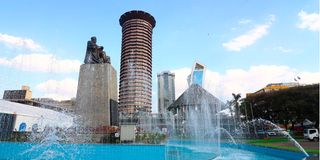
The High Court on Thursday ruled that the President cannot be sued in his personal capacity.
President William Ruto’s government failed attempt to have a judgment blocking the sale of 11 parastatals suspended adds to a growing list of controversial policies by the Kenya Kwanza administration thwarted by the courts.
The Court of Appeal declined to suspend the judgment that had quashed the Privatisation Act, 2023, that had eased the path for the government to unilaterally sell State firms. The court noted that the government had failed to demonstrate how its appeal would be rendered useless without the suspension.
This setback came days after the courts declared unconstitutional a task force President Ruto appointed on police reforms, adding to the list of derailed projects touching on health, education and infrastructure, including the cancelled Adani Group deals to upgrade the main airport and power lines.
Dr Ruto’s administration had argued that some loss-making parastatals were draining public resources, forcing the government to finance and maintain assets that offer no tangible public benefit.
However, reports that some rich State firms were among those lined up for sale and the attempt to bypass Parliament’s authorisation raised concerns about the motive of the privatisation.
Declared unconstitutional
The Act had been declared unconstitutional in September 2023, mainly for lack of meaningful public participation. Justice Chacha Mwita also found that it violated the National Assembly’s oversight role.
Following the decision, Attorney-General Dorcas Oduor and Parliament sought the suspension of the judgment pending appeal, but Justices Fred Ochieng, Weldon Korir and Joel Ngugi found no compelling evidence of public interest to warrant granting the request. The judges added that the court cannot make a finding that an appeal would be rendered useless based solely on conjecture or speculative reasoning.
According to the judges, public interest tilted in favour of declining the application since suspending the judgment could allow the government to sell off strategic or monopolistic assets, potentially causing irreversible harm.
“Should this happen, both the transfer of functions and costs are likely to be irreversible. Therefore, it is our view that public interest lies in awaiting the determination of the appeal,” they said.
While quashing the Act, the Hugh Court said section 22(5), which provides that if the National Assembly does not ratify a decision on privatisation within 90 days then the decision will be deemed ratified, was unconstitutional.

The Kenyatta International Convention Centre in Nairobi.
It also ruled that privatising the Kenya International Convention Centre (KICC), a national monument, contravened Article 11(2) of the constitution and violated the Monuments and Heritage Act.
The petition challenging the law was filed by Mr Raila Odinga’s ODM party, which argued that the targeted firms were of strategic importance and that their privatisation threatened Kenya’s sovereignty.
In addition to KICC, other affected entities were New Kenya Cooperative Creameries, National Oil Corporation of Kenya, Mwea Rice Mills, Western Kenya Rice Mills, Numerical Machining Complex and Kenya Vehicle Manufacturers. Moi University-owned Rivatex East Africa, Kenya Literature Bureau, Kenya Pipeline Company and Kenya Seed Company were also lined up for sale.
Earlier this month, Justice Lawrence Mugambi nullified the formation of a task force on police and prison reforms chaired by former Chief Justice David Maraga, throwing into jeopardy the recommendations contained in the team’s report.
Sh108 billion
The task force sought to address salaries, housing and working conditions of the officers, as well as changes like the shake-up of the traffic department and reviewing of police recruitment procedures.

President William Ruto (right) receives the security agencies welfare reforms task force report from former Chief Justice David Maraga at State House Nairobi on November 16, 2023.
Justice Mugambi said its formation was unconstitutional as it usurped the mandate of the National Police Service Commission.
The Ministry of Interior said the proposed reforms were estimated to cost Sh108 billion and included building 28,000 housing units for Kenya Prisons Service officers.
In another case, Justice Mwita struck down a government directive requiring all school fees to be paid through the eCitizen platform, terming it irrational and lacking legal basis. He added that the Sh50 convenience fee was a double charge and unjustified.
“This is irrational and unconscionable. There was also no explanation regarding who would receive the convenience fee and what it is used for, making the charge unlawful,” said the judge.
The case had been brought by Dr Benjamin Magare-Gikenyi, who also challenged a circular from former Education Principal Secretary Belio Kipsang’ enforcing the directive.
In February, Justice Bahati Mwamuye quashed another task force meant to guide reforms in the health sector. The judge said in his decision that the task force’s role overlapped with that of the yet-to-be-formed Kenya Health Human Resource Advisory Council, established under the Health Act.
In December, the court invalidated the new university funding model, stating it lacked legal grounding and had bypassed public participation. However, in March, parties reached a compromise and agreed to suspend the ruling pending appeal. This allowed the government to proceed with the controversial Variable Scholarship Loan Funding Model.
The parties further agreed that the AG, Higher Educations Loans Board and the trustees of the Universities Fund would publicise to all students and stakeholders an appeals mechanism to be used by students aggrieved by funding decisions or categorisation. This was to be done within 14 days.
A July 2023 decision by a three-judge bench—justices Alfred Mabeya, Robert Limo, and Fred Mugambi—invalidated three new health laws introduced by the Kenya Kwanza administration.
The laws—Social Health Insurance Act, Primary Health Care Act and Digital Health Act—were quashed for lack of adequate public participation before they were passed. However, the judges suspended the judgment for 120 days to allow for corrective action by Parliament.
The government sought to use the laws to promote the implementation of the universal health coverage (UHC) and ensure that every person accessed the highest standard of healthcare. In its appeal, the government argued that the laws had been operational for six months without incident and were critical pillars of UHC. It warned that without the laws, health services might collapse.

Indian billionaire Gautam Adani speaks during an inauguration ceremony after the Adani Group completed the purchase of Haifa Port earlier in January 2023, in Haifa port, Israel January 31, 2023.
Late last year, the government was forced to cancel two high-value contracts that had been awarded to India’s Adani Group. The deals were for the renovation and expansion of Jomo Kenyatta International Airport, and building and operating energy transmission lines and substations at a cost of Sh96.68 billion through a 30-year lease.
President Ruto announced the cancellations during his State of the Nation address, following reports that owner Gautam Adani and associates had been indicted in the United States for bribery and fraud.
In another unresolved legal battle, the High Court suspended a task force appointed by President Ruto to audit Kenya's public debt. The President had formed the team on July 5, 2023, to conduct a forensic audit and present findings within three months.
The petitioners argued that the task force was unconstitutional and duplicated the role of the Auditor-General.










